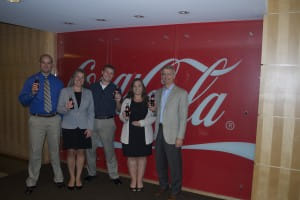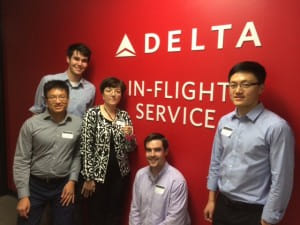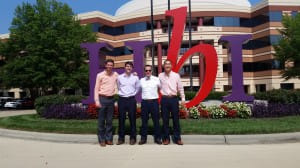The capstone course is a tremendous strength of the Master’s of Science in Business Analytics program at the Haslam College of Business, giving students exciting hands-on experience working with real companies to solve real problems. With plenty of support from faculty advisors, students in the capstone course have the opportunity to analyze data and tackle problems for major corporations such as Coca-Cola, Delta Air Lines and HanesBrands.
 How does the course work? “We break the students into teams of three or four, and pick one person to be the project manager, just as if they were on a team out there in the real world,” says Melissa Bowers, Beaman Professor of Business. “We choose the teams based on the skill sets of the students and the needs of the company.”
How does the course work? “We break the students into teams of three or four, and pick one person to be the project manager, just as if they were on a team out there in the real world,” says Melissa Bowers, Beaman Professor of Business. “We choose the teams based on the skill sets of the students and the needs of the company.”
The project manager in each group must make sure the project moves forward, stay in constant contact with the capstone partner contact at the company, and schedule milestone events and biweekly conference calls. “Students check in with the corporate partner frequently so they can have an opportunity to answer questions and work through issues,” says Bowers. “Each project takes about fifteen weeks, the length of a semester.”
Bowers and other faculty members go through a careful process to select data analytics projects that fit students’ skills. “We contact a number of organizations, many of them Fortune 500, to participate as capstone companies,” Bowers says. “If they agree, we ask for problems or issues they are currently facing related to analytics and work with them to settle on a project idea.”
 Each student team has its own faculty mentor, who travels with them to the company’s headquarters early in the course. “We meet with VP-level senior managers to introduce students to the project,” Bowers says. “It’s an opportunity for students to see the company firsthand—for example, one of the projects we did this past fall was with Delta Air Lines, and we did a visit to the airport coordination center, a Delta tower at the airport in Atlanta.”
Each student team has its own faculty mentor, who travels with them to the company’s headquarters early in the course. “We meet with VP-level senior managers to introduce students to the project,” Bowers says. “It’s an opportunity for students to see the company firsthand—for example, one of the projects we did this past fall was with Delta Air Lines, and we did a visit to the airport coordination center, a Delta tower at the airport in Atlanta.”
Sean Willems, Haslam Chair in Supply Chain Analytics, teaches the large-group class meetings involving all the student teams. “Some teams get the data faster than other teams, or a big insight first, but they’re all going to get to the same point eventually,” Willems says. “My job is to show the common themes that run across the projects. It’s incredibly fun for me.”
 Willems enjoys witnessing the students’ enthusiasm at the beginning of each project. “They’re chomping at the bit to go apply what they’re learning, and this is the first real opportunity they have,” he says. “It’s a safe environment, they can do it but there’s a lot of structure, and the project manager on the company side has been well selected. I don’t think there is any doubt that the capstone experience is the best part of our program. It’s a jewel for the students.”
Willems enjoys witnessing the students’ enthusiasm at the beginning of each project. “They’re chomping at the bit to go apply what they’re learning, and this is the first real opportunity they have,” he says. “It’s a safe environment, they can do it but there’s a lot of structure, and the project manager on the company side has been well selected. I don’t think there is any doubt that the capstone experience is the best part of our program. It’s a jewel for the students.”

